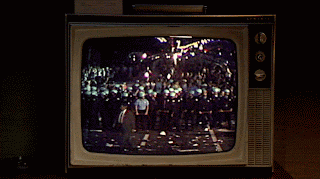[The twelfth in the Unit for Criticism's multi-authored series of posts on Season 6 of AMC's Mad Men, posted in collaboration with the publication of MAD MEN, MAD WORLD: Sex, Politics, Style, and the 1960s (Duke University Press, March 2013) Eds. Lauren M. E. Goodlad, Lilya Kaganovsky and Robert A. Rushing]
"The Only Unpardonable Sin"
Written by: Lauren Goodlad English/Unit for Criticism)

The literal referent of “In Care Of” is a letter received from the District Attorney of the County of New York addressed to Miss Sally Beth Draper, “c/o Mr. Donald F. Draper.” But in a more a figurative sense, the motif of care—and of care of another—runs throughout this final episode of Mad Men’s Season 6. As the season concludes, the only care Pete exhibits for his mother’s passing is his getting his fair share of her furniture, having determined that an all-expense paid private eye to “bring [his] mother’s killer to justice” was not worth the cost. (This and the black comedy in which the scene between Pete and the SS Sunset Princess was played, left us little time to contemplate the apparent treachery of Manny—a/k/a “Marcus Constantine”—who seduces Pete’s mother while she is in his care, marries her for the money he believes she has, and then throws her over the side of a ship into shark-infested waters.)

Caring for others is not much on the mind of Manny’s friend Bob Benson, though he has taken great care to rid himself of Pete, the keeper of his secret, who now will set off for LA as a (not-so-gay) divorcé. Bob still retains the air of his enigmatic beginnings: was he a corporate spy, we had wondered? Or just an empty suit with a penchant for sucking up? Did he know Manolo was a gold-digger? Whatever else he may be, we know that Bob is a gay man more at ease in the closet than Sal Romano ever was—but with a contrived identity that clearly doubles him with Don (just like his alliterative, tri-syllabic name). Bob’s providing a handy Best Guy Friend for Joan may, perhaps, be a sincere form of care—which would make him the ultimate example of what Mad World contributor Alex Doty called the type of the “helper homosexual.” But what “In Care Of” makes entirely clear is that Bob’s stunt in Detroit—as he manipulates Pete into exposing himself as the one man in Motor City who cannot drive a stick—is the kind of maneuver we’ve seen Don pull off many times.

But was there ever a worse time to ask “What would Don Draper do?” The answer, of course, is both yes and no. Less the finale of a single season than a turning point after 77 hours of serial television, for Don, we might say, “In Care Of” marks the best of times and the worst of times. Dante scholars can debate where precisely he was throughout most of this season in the trajectory marked out by the premiere’s opening reference to Inferno: “Midway in our life’s journey/I went astray from the straight road/And woke to find myself in a dark wood.” What is clear by the end of “In Care Of,” is that Don may soon be leaving Hell and heading for Purgatorio. For Dick Whitman has, at long last, heeded the words he heard from an itinerant preacher thrown out from the whorehouse many moons ago: “The only unpardonable sin is to believe God cannot forgive you.”
Read more
[The ninth in the Unit for Criticism's multi-authored series of posts on Season 6 of AMC's Mad Men, posted in collaboration with the publication of MAD MEN, MAD WORLD: Sex, Politics, Style, and the 1960s (Duke University Press, March 2013) Eds. Lauren M. E. Goodlad, Lilya Kaganovsky and Robert A. Rushing]
"Us, Them"
Written by: Caroline Levine (University of Wisconsin-Madison)
Carnation Instant Breakfast or Life cereal? CGC employees or the SCDP team? On the one hand, this episode is pretty relentless in its insistence on division. It’s either them or us: New York or Los Angeles, Joan or Pete, Humphrey or Nixon, demonstrators or cops. Don reminds Megan that she’s Canadian, not a US citizen. Avon Cosmetics faces a choice between getting groovier and waxing nostalgic. Joan think she’s on a date, but it turns out to be a business meeting. She then replaces Pete at breakfast, while Carnation replaces breakfast itself. Not both. One or the other.


Read more
top







